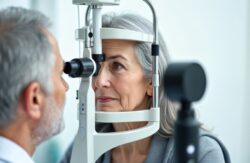Sleep Apnea and Your Vision — Are You at Risk of Going Blind?
August 18, 2025
If you have diabetes, you are likely well aware of some of the things you must do in order to manage your health. Without proper care, your condition could lead to devastating consequences! One aspect of your overall wellness that may be at risk is your vision; research indicates that people with both diabetes and sleep apnea have a higher chance of experiencing eyesight problems and even blindness. How are these conditions connected, and what can you do to protect your vision? This blog post explains.
Diabetic Retinopathy: What You Need to Know
Diabetic retinopathy is a frequent complication among individuals with diabetes. This condition affects the retina, which is the sensitive tissue located at the back of your eye. Elevated blood sugar levels can damage the blood vessels in your retina, placing you at risk for vision loss and possibly blindness. The progression of this damage often occurs gradually, and you may also be subject to swelling of the macula (a critical part of your retina), known as macular edema, which can further threaten your vision.
The Overlooked Link between Sleep Apnea and Vision Problems
Sadly, research shows that sleep apnea increases the likelihood of developing severe forms of diabetic retinopathy and macular edema. What accounts for this connection? Several factors are often involved:
- Sleep apnea causes repeated pauses in breathing each night, which contributes to higher blood pressure. In turn, this can speed up damage to the blood vessels within your eyes.
- When your sleep quality suffers, your body’s ability to regulate hormones, such as insulin, declines. This disruption complicates diabetes management and raises your risk of eye complications.
- Poor sleep prevents your body from carrying out vital repair functions, which are necessary for keeping your eyes healthy.
Warning Signs You Should Address Promptly
If you have diabetes, you must pay close attention to symptoms that may signal sleep apnea or vision problems. Speak with your health care provider if you experience any of the following:
- Loud snoring during the night.
- Daytime fatigue or sleepiness despite spending adequate time in bed.
- Frequent awakenings throughout the night or difficulty staying asleep.
- Sudden changes in vision, such as blurriness, dark spots, or floaters in your field of view.
Practical Steps to Safeguard Your Eye Health
While the above information might seem scary, you can take courage in knowing that there are practical steps you can take to protect your eye health:
- Consult your physician about scheduling a sleep study if you suspect you have sleep apnea. After receiving a diagnosis, you can start to explore treatment options, such as a custom oral appliance from a dentist.
- Follow your diabetes management plan as prescribed. Keeping your blood glucose within the recommended range lowers your risk of developing diabetic eye diseases.
- Consume a balanced diet and engage in routine physical activity. These choices support blood sugar stability and overall wellness, including the health of your eyes.
- Attend regular eye examinations with an optometrist or ophthalmologist. These checkups can identify early signs of diabetic retinopathy or other complications before significant symptoms arise.
Sleep apnea and diabetes present substantial risks to your vision! By remaining attentive to symptoms and taking proactive measures, you may be able to preserve your eyesight and enhance your quality of life.
Meet the Practice
Drs. Kenneth Mogell and Yitta Garden are both board-certified in dental sleep medicine. They work together to provide custom oral appliance therapy for individuals who have been diagnosed with obstructive sleep apnea. If you believe you have this condition, or you would like to explore your treatment options, our team would be happy to answer your questions. Contact our Vero Beach office at 772-882-6800.
